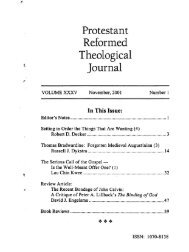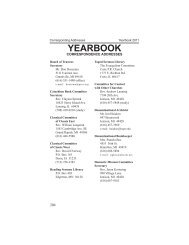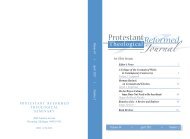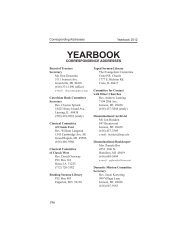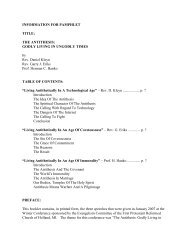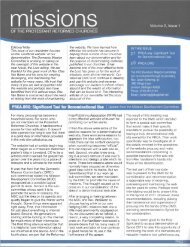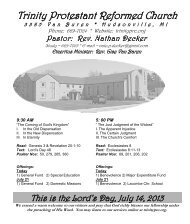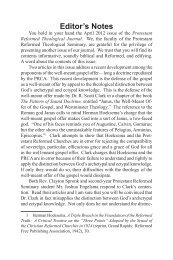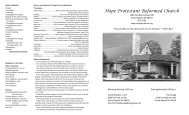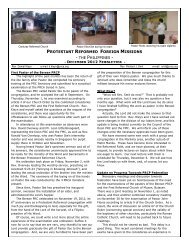November 2007 - Protestant Reformed Churches in America
November 2007 - Protestant Reformed Churches in America
November 2007 - Protestant Reformed Churches in America
You also want an ePaper? Increase the reach of your titles
YUMPU automatically turns print PDFs into web optimized ePapers that Google loves.
Book Reviews<br />
<strong>in</strong> Systematic Theology”; Kev<strong>in</strong><br />
J. Vanhoozer, “On the Very Idea<br />
of a Theological System: An<br />
Essay <strong>in</strong> Aid of Triangulat<strong>in</strong>g<br />
Scripture, Church and World”;<br />
A. T. B. McGowan, “The Atonement<br />
as Penal Substitution”;<br />
Richard C. Gamble, “The Relationship<br />
between Biblical Theology<br />
and Systematic Theology”;<br />
Henri Blocher, “Old Covenant,<br />
New Covenant”; Richard<br />
B. Gaff<strong>in</strong>, Jr., “Union with<br />
Christ: Some Biblical and Theological<br />
Reflections”; Cornelis P.<br />
Venema, “Justification: The<br />
Ecumenical, Biblical and Theological<br />
Dimensions of Current<br />
Debates”; and Derek W. H. Thomas,<br />
“The Doctr<strong>in</strong>e of the<br />
Church <strong>in</strong> the Twenty-First Century.”<br />
The more profitable contributions<br />
to Always Reform<strong>in</strong>g, <strong>in</strong><br />
the judgment of this reviewer,<br />
are the pieces by Reymond,<br />
McGowan, Gamble, Venema,<br />
and Thomas. Reymond surveys<br />
the extensive New Testament<br />
evidence for Jesus’ deity, demonstrat<strong>in</strong>g<br />
conclusively, from<br />
Gowan’s contribution on “The<br />
Atonement As Penal Substitution”<br />
is well done. Over aga<strong>in</strong>st<br />
all other theories of the atonement,<br />
he demonstrates that the<br />
classic <strong>Reformed</strong> doctr<strong>in</strong>e of the<br />
atonement as penal substitution<br />
is the clear teach<strong>in</strong>g of Scripture<br />
and the only answer to the<br />
real need of guilty s<strong>in</strong>ners.<br />
Gamble discusses the relationship<br />
between biblical theology<br />
and systematic theology. He<br />
defends the position that biblical<br />
theology is the handmaid of<br />
systematic theology. Although<br />
there are issues regard<strong>in</strong>g biblical<br />
theology and the basic approach<br />
of biblical theology,<br />
Gamble’s <strong>in</strong>sistence on the importance<br />
of careful, honest exegesis<br />
as the foundation for all<br />
theology and his commitment to<br />
the full <strong>in</strong>errancy and authority<br />
of Scripture are appreciated.<br />
Venema’s treatment of justification<br />
by faith alone and his <strong>in</strong>sistence<br />
on the forensic nature<br />
of justification are to be commended.<br />
He also provides a<br />
good evaluation of Lutherans<br />
several exegetical po<strong>in</strong>ts of and Catholics together,<br />
view, the united witness to the<br />
godhead of Jesus. He concludes<br />
his chapter by consider<strong>in</strong>g some<br />
of the weighty issues that <strong>Reformed</strong><br />
theologians face <strong>in</strong> the<br />
Evangelicals and Catholics together,<br />
and the New Perspective<br />
on Paul. Thomas’ treatment of<br />
the doctr<strong>in</strong>e of the church is to<br />
be commended. Much appreciated<br />
area of Christology. Mc<br />
is his <strong>in</strong>sistence on the im-<br />
<strong>November</strong> <strong>2007</strong> 113



